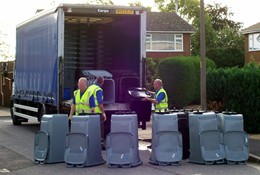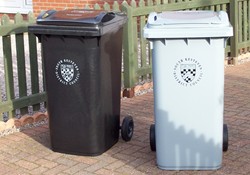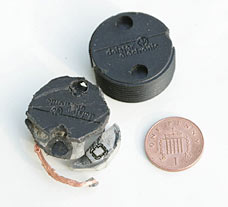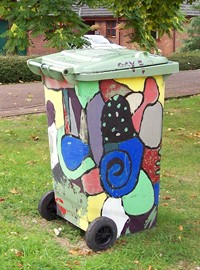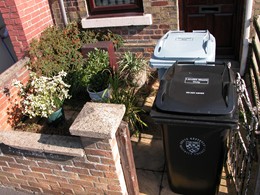|
Wheeling out the wheelie bins A PUBLIC RELATIONS DISASTER FOR SOUTH by REX NEEDLE WHEELIE BINS are being delivered to all homes in Bourne during the autumn of 2006 as part of South Kesteven District Council’s recycling initiative, one of the most controversial public service issues of recent years. They have been condemned as being too big and
bulky and that many homes have no space to store them, blocking side
passageways and even left in front gardens. Terraced houses such as those in the Austerby, Hereward
Street, Elm Street, Burghley Street and St Peter‘s Road face particular
difficulties.
A bumper bundle of instructions is delivered with the bins, leaflets of do’s and don’ts, charts and stickers, advising what should and should not go into each one and urging homeowners to avoid unnecessary packaging, select only loose fruit and vegetables, use the milkman, boycott non-reusable products and stop buying bottled water, tissues and disposable nappies. The programme was inspired not so much by public need as a requirement by SKDC to reach government targets but it proved to be a disastrous launch with insufficient information circulated and a final resort to threats and intimidation by the council to force home owners to toe the line and observe the rules and regulations or face heavy fines. There is also evidence that the decision to introduce them was taken by the inner cabinet without a full debate in council and that many councillors were not even aware that the bins were to be fitted with microchips to monitor progress. The council said that its 55,000 home owners were already recycling more than a quarter of their waste which was well above the official target of 18%. By 2010, local authorities will be expected to increase their efforts to almost one third and officials were confident that the new wheelie bin system would keep the council ahead. Chief executive Duncan Kerr told his inner cabinet: “The roll out of our twin bins will ultimately give the council a recycling rate of 50% making it one of the leading authorities in the country for recycling.” There was an added ingredient of controversy when it was revealed that the bins were to be fitted with the electronic chips containing a serial number and a facility to record the weight of the contents when they were emptied into the collection lorry.
When this became known, they were immediately dubbed bin "bugs" which were being introduced in readiness for a system of pay-by-weight and the spies-in-the-bin debate was given nationwide coverage by the media but SKDC repeatedly denied that any move for home owners to pay for rubbish disposal was being considered and insisted that the microchips were nothing more than identifying tags, despite a statement from the makers to the contrary. The German firm Deister Electronic (UK) Ltd, which has a base at Spalding, is one of several companies selling the technology. Their devices, called chip-sensoren or chip sensors, carry a unique serial number which can be scanned when the bin is tipped into a refuse lorry carrying weighing equipment which records how much rubbish is collected and links the information to the appropriate bin. The system incorporates Radio Frequency Identification (RFID), a technology that has also been used to track objects as diverse as animals, vehicles and expensive goods and the company maintains that they are a harmless device and little more than a bar code that will enable the council ensure that refuse collections are carried out in a thorough and efficient manner. It was argued that if they were merely bar codes then they were an expensive addition, costing £2 each, a total of £220,000, plus £15,000 per electronically adapted vehicle. The installation of the microchips angered many people and Mr Brynley Heaven, of Aslackby, near Bourne, extracted them from each of his two bins and returned them to the Chief Executive of SKDC, Duncan Kerr, with the following message, copy to our Member of Parliament, Quentin Davies: Please find enclosed my two wheelie bin bugs. As Councillor Trevor Holmes [of Bourne Town Council] says, there is an agenda here to get us eventually to Pay by Weight of rubbish. This would be an attack on low income families. If parliament passes the Pay by Weight legislation, I will comply with it. Until then, here are your bugs. Enjoy! - Brynley Heaven. P S: Enclosed: two bugs. Mr Heaven was subsequently threatened with a fine of £1,000 for damaging council property but after widespread coverage of his actions by the newspapers and television, the council told him that there would be no prosecution this time although his bins would not be emptied in the future. As home owners had not actually been officially told that the bins are bugged and not a word about them appeared in the special information pack distributed to all homes, it would be difficult to see how the council could either fine or enforce a boycott on a householder who is paying his council tax which helps finance this service.
Mr Heaven, aged 53, a former London
councillor for the borough of Hackney, was not to be cowed by such threats
because he told the local newspapers that he would be prepared to go to
court if necessary. “I hope it does not come to that”, he said. “I think
there is an element of bluff here and the real purpose of the microchips
is to prepare the ground for pay-by-weight collections. This would mean
young families paying the most while the high-flying young executive who
eats out all the time pays less. It is all wrong. This is a council that
only a few days ago said that introducing the scheme would be all carrots
and no sticks. It must be the fastest U-turn in history and I am surprised
by their response. Fortunately, they have climbed down this time and have
decided not to refer the matter to the police which proves that they are
all mouth and no trousers”.
The debate reached the airwaves on Tuesday 26th September 2006 when Mr Heaven was interviewed for the morning show on Radio Lincolnshire. He had done his homework and left Ms Dawn Temple, the sustainable waste management policy officer for SKDC, struggling to find a reason why they had been fitted in the first place implying that the public had been fully informed despite few people having even heard about them until the protests began. She also said that the decision to use the microchips had originally been taken in private by members of the council’s inner cabinet and that it was discussed in full council but this did not appear to be the case and no councillor came forward to substantiate it. Also, despite her repeated denials, listeners were left with the distinct impression that pay by weight for refuse is on the way at some time in the near future. The wheelie bins may serve a useful purpose in the short term until a more satisfactory system is devised but one thing is certain: the introduction of them by SKDC was a lamentable exercise in public relations and should be the cause of some scrutiny at council headquarters in Grantham, particularly the information sheet that was sent to householders on Friday 29th September giving the launch date with dire warnings for transgressors which was little short of a threatening letter. However, like them or loathe them, they are here to stay until proven by practice not to be the answer to our refuse problems and will most surely end up being recycled themselves, the same fate as the green and blue plastic containers used in the last system that is now being shelved. These too are owned by South Kesteven District Council and home owners have yet to be told what to do with them. One of the main suspicions about the waste recycling programme was that the material would end up in landfill sites as in the past because the authority had never fully explained its intentions. Eventually, in October, it was revealed that all recyclable materials collected each fortnight from the silver wheelie bins would go to the processing plant at Caythorpe, near Grantham, run by Mid UK Recycling Limited, one of the leading partners for waste management services in the East Midlands, composting, materials recovery and recycling facilities.
Here, 15 tonnes are sorted every hour, the capacity of just over two council collection lorries. Paper, cardboard, plastics, cans, aerosols, glass and textiles are sorted along 22 conveyors operating at 180 metres a minute. Magnets separate steel cans from aluminium cans and infra-red sorters scan for polymers found in plastics, identify the items and eject them and the sorted waste is then packed into bales and sent for recycling. The Caythorpe plant can deal with waste from 100,000 households a week (South Kesteven has 55,000 of them) and will process 20 to 25 million plastic bottles and two million cans a year. After a fortnight of using the wheelie bins, many householders realised that they had been throwing away too much waste that could be recycled and the council’s target of increasing the quantity from the current figure of 26% to 50% by 2008 is likely to be achieved much sooner than expected. A sample check showed that the black bin which was emptied after one week was less than quarter full while the silver bin was filled to capacity after a fortnight and at the present rate, additional material will obviously have to be put out on collection day in clear or white carrier bags, cardboard or plastic boxes, in accordance with the council guidelines, until the frequency of emptying is increased. But in October 2006, it became evident that the council
had got it wrong over the installation of microchips. Stephen Bates, who
advises local authorities on environmental policies, told "arrogant"
council chiefs who had fitted them to remove the devices free of charge to
head off a householder revolt that was already evident in Bourne through
the actions of Mr Heaven.
The public animosity engendered by the scheme will be highlighted when Mr
Bates addresses a seminar in Sheffield in November organised by the
Chartered Institution of Wastes Management which will no doubt be attended
by our experts from SKDC. In the meantime, his thoughts on the subject
were being formulated. “Recycling has become so bogged down in procedure
and a culture of box ticking that the core reason of environmental
protection has been lost,” he said. “This leads to a perception of
arrogance although a good way to build trust is to offer residents the
option of having the chips removed from their bins. This may be seen as a
high risk strategy by the council but providing residents are fully
informed as to why they are there in the first place, there is a fair
chance of them accepting their presence.” Extracts from the wheelie bin debate during 2006 It won't be so bad if they can make them in staggered sizes so that each one will fit inside the next one up, just like those Russian dolls. Then I can just wheel them round to the back of the house and forget about them until I get round to throwing them all into a skip at the recycling centre. - message to the Bourne Forum by Peter Sharpe, Monday 12th June. What should I do if the wheelie bin is full? - Simply display the words Bin Laden Here in your window. This will ensure that you are visited promptly. What about those who live in a block of flats? They will be issued with airline-style chutes enabling them have the bin at the kerbside within 18 seconds. - extract from “Ten questions about your wheelie bin” published in the June issue of the village newsletter at Aslackby, near Bourne. Looking at the bug makers web site, they are way over the top if the intention is simply to help identify which bin belongs to which property. A pot of paint to write the house number would be a far cheaper way so there seems little doubt that the longer term plan is to charge excessive waste producers. I foresee a poll tax type rebellion as soon as they are introduced. - contribution to the Bourne Forum by Bob Currell, Tuesday 29th August.
If the bins remain the property of the council, what
right have they to park them on our property without permission? If home
owners object to having them, then all they need do is refuse to accept
them and leave them outside on the road. If they were found to be causing
an obstruction then the council, as owners of the bins, would be at fault.
No court in the land would find in favour of the council if, in its
misguided wisdom, it decided to take it to law. If you peruse your next Betterware or Kleeneeze
catalogues you will find some wheelie bin customisation kits. As far as I
recall you can make it look like trailing ivy and also possibly Jordan
without her bra and pants on (although that might be an ironing board
instead).
What's to stop us all taking the bugs out and putting them in a bag, give it a good shake and each taking two bugs out to put back in our bin lids. Better than a bran tub and with a distinctly interesting outcome when the data is downloaded. - contribution to the Bourne Forum by Roger Callow on Sunday 24th September. For those that are worried about the presence of said chips, instead of removing them and giving the council an excuse not to empty your bins, run a strong magnet over the chips several times. That should be enough to prevent them working! - contribution to the Bourne Forum by Adrian Howell on Monday 25th September. SKDC would find it almost impossible to prosecute anyone for criminal damage for removing the bugs as they would need direct evidence that a specific individual had removed the chip. - contribution to the Bourne Forum by Pete Neumann on Tuesday 3rd October . It is worth noting that Duncan Kerr, chief executive of SKDC, has appeared on various local news channels claiming that the chips are not spies. Conversely, he claims that those of us who abide by their rules will be rewarded. It would be interesting to hear how that latter can happen unless the former is possible. - letter to the Lincolnshire Free Press from "Disillusioned ratepayer", Deeping St James, near Bourne, Tuesday 17th October. The microchips could well be seen as an invasion of privacy because they are collecting data at a household level and there should therefore be an opt out for anyone who does not want personal data stored or used by the council. - John Ozimek, business consultant and former data protection officer, in an interview with The Local newspaper, Friday 20th October, after he asked the Information Commissioner's Office to investigate a possible breach of the data protection laws. South Kesteven District Council is advising home owners during the coming festive season to buy less food and fewer presents, not to send Christmas cards and to make other economies in those areas that might generate excess waste and fill the silver wheelie bin too soon. Dawn Temple, the sustainable waste management policy officer, said that the council was not taking a “Bah, humbug” stance about merrymaking and partying but they did not want to be faced with mountains of discarded food and other materials. “Every year, refuse collectors see their loads doubled as a result of extra packaging, wrapping, Christmas trees, decorations, cards and uneaten meals”, she said. “We are trying to give people food for thought but having an environmentally friendly holiday does not mean you have to be a miser.” - news report from the Grantham Journal, Friday, 20th October.
WRITTEN OCTOBER 2006 See also Rebel protest ends One man's solution to infrequent collections Return to Rubbish collections
Go to: Main Index |
|||||||||||||||||||||||||||

